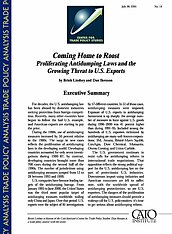Once a vice peculiar to the United States and a few other wealthy countries, antidumping protectionism has become increasingly popular among developing countries. As those countries reduce traditional trade barriers in the form of tariffs and quotas, antidumping has emerged as a convenient protectionist alternative.
During the 1990s, antidumping use increased by 50 percent relative to the ’80s. The surge in new cases reflects the proliferation of antidumping laws in the developing world. Developing countries accounted for only seven investigations during 1980–87; by contrast, developing countries brought over 700 cases during the second half of the 1990s. The number of antidumping-using jurisdictions jumped from 12 to 28 between 1993 and 1999. A total of 62 jurisdictions now have antidumping laws on their books.
U.S. companies have become leading targets of the antidumping barrage. From January 1995 to June 2000, the U.S. was the third most popular target of antidumping measures worldwide — trailing only China and Japan. Over that period, U.S. exports were the subject of 81 investigations by 17 different countries. In 51 of those cases, antidumping measures were imposed. Exposure of U.S. exports to antidumping harassment is up sharply: the average number of measures in force against U.S. goods during 1996–2000 was 41 percent higher than during 1991–1995. Included among the hundreds of U.S. exporters victimized by antidumping are many well-known corporations: 3M, Amana, Bristol-Myers Squibb, ConAgra, Georgia Pacific, Monsanto, Owens Corning, and Union Carbide.
The U.S. government continues to resist calls for antidumping reform in international trade negotiations. That opposition reflects the strong political support for the U.S. antidumping law by protectionist U.S. industries. Downstream import-using industries and American consumers are left to suffer; now, with the worldwide spread of antidumping protectionism, so are U.S. exporters. The dangers of antidumping proliferation should provide a wakeup call for U.S. policymakers: it’s time to get serious about antidumping reform.



